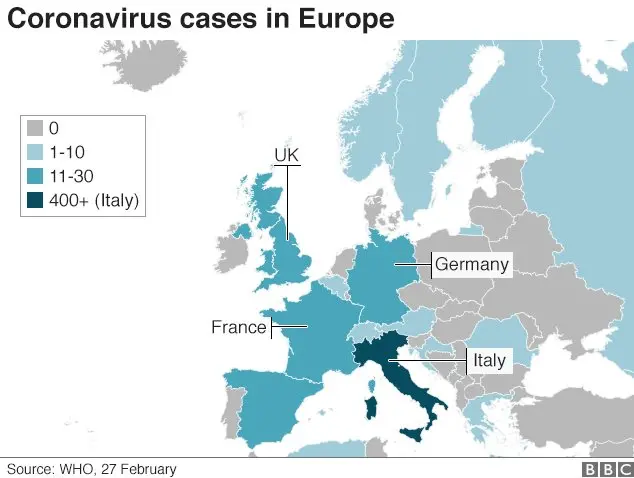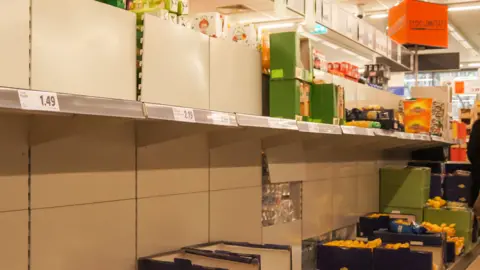Coronavirus in Europe: Epidemic or 'infodemic'?
France must prepare for a coronavirus epidemic, President Emmanuel Macron says, but Italy - the worst-affected country in Europe - says misleading news is creating an "infodemic".
Mr Macron is due to discuss the crisis with Italian Prime Minister Giuseppe Conte in Naples.
In Italy 528 people are infected and 14 have died, officials say, amid global efforts to stop the virus spreading.
Germany is also facing an epidemic, Health Minister Jens Spahn has said.
Italy registered a 25% surge in coronavirus cases in 24 hours, and the infections remain centred on outbreaks in two northern regions - Lombardy and Veneto. But a few cases have turned up now in southern Italy too.
Thirty-seven people have now recovered in Lombardy, civil protection chief Angelo Borrelli said.
Italy's Foreign Minister Luigi Di Maio told reporters that an "infodemic" of misleading news abroad was damaging Italy's economy and reputation.
He said all the infections in Italy could be traced back to the two outbreaks in the north, and just 0.1% of towns in Italy were affected.

Lombardy governor Attilio Fontana put himself into self-isolation after a member of his team tested positive. On Facebook he said he and the rest of his team had tested negative so far, but would remain in quarantine for 14 days.
Italy's tourism association Assoturismo says March accommodation bookings are down by at least €200m (£170m; $219m) because of the virus.
 Reuters
ReutersOn Wednesday the World Health Organization (WHO) said that for the first time the virus was spreading faster outside China, where it originated.
Globally, more than 80,000 people in more than 40 countries have been infected with the new coronavirus, which emerged in December. The vast majority remain in China.
Covid-19, the respiratory disease caused by the virus, has killed more than 2,700 people so far.
On a surprise hospital visit on Thursday, President Macron warned: "We are facing a crisis, an epidemic, that is coming."
He was at La Pitié-Salpêtrière hospital in Paris, where a 60-year-old man carrying the new coronavirus died on Tuesday. There has been one other fatality in France - a Chinese tourist.
Two more patients have tested positive in England, bringing the number of UK cases to 15.

'Don't panic': Italy's image problem
The BBC's Mark Lowen in Milan writes:
Italy's government is in fightback mode, trying a concerted approach to lessen the coronavirus panic. "It's time to stop the panic", said Prime Minister Conte, asking the national broadcaster Rai to "tone down".
On the front pages of Italian newspapers, the top story is no longer the rising number of cases, but appeals for calm. The mayor of Milan, where many hotels and restaurants are half-empty, has called for some museums to reopen.
A new video released by the authorities shows vibrant scenes from the city with the message: we're not afraid and we're open for business.
But this is a story driven by perceptions. And with President Donald Trump mentioning possible future travel restrictions to Italy, Israel barring foreigners arriving on flights from Italy, and Kuwait evacuating its nationals from Milan, the Italian government faces a challenge to change the narrative.
Allow X content?

Elsewhere in Europe:
In Spain, a sudden rise in infections has triggered concern, but not panic, the BBC's Guy Hedgecoe reports.
A man in Seville got infected without having travelled abroad recently, suggesting that the virus has been present in Spain longer than thought.
In Tenerife, in the Canary Islands, a hotel with nearly 1,000 guests in it remains in quarantine. There are fears that Easter Week holiday events in Spain will be affected by coronavirus.
 Getty Images
Getty ImagesIn Romania, the first coronavirus case was confirmed on Wednesday - a man from Gorj county in the south. He had been in contact with an Italian visitor, who was later confirmed ill with the virus. The Romanian authorities are trying to trace and quarantine everyone he met in Romania.
The BBC's Nick Thorpe reports that 91 people are now in quarantine, and 7,174 in isolation at home. One million Romanians work in Italy, and there are many direct flights.
Romanian President Klaus Iohannis has urged Romanians not to panic, after anxious shoppers emptied some supermarket shelves and intimidation of Asian people was reported.
In Hungary, the Honved Budapest football team has temporarily suspended its Italian coach Giuseppe Sannino and his assistant Alessandro Recenti, fearing they might have had contact with Italian virus carriers.
There is growing concern and some panic-buying of face masks and hand disinfectants, but no confirmed cases in Hungary, Nick Thorpe reports.
In Switzerland, hand sanitiser has sold out in Bern and popular cafes are quieter than usual, the BBC's Imogen Foulkes reports.
The Geneva watch fair, hugely lucrative to the city, has been cancelled. Tourism from China is down 50%; tourist resorts report a loss already of more than 20m Swiss francs (£16m; $20m).
Four cases of coronavirus have been confirmed in Switzerland, which shares a long border with Italy: tens of thousands of people cross it daily to work. Borders will not be closed, but border guards are issuing health advice.
Ten new laboratories have been set up, to analyse 1,000 possible cases a day. A nationwide campaign with the slogan "This affects us all!" will begin on Friday.
In Germany 26 people have been infected, 14 of whom work for an equipment manufacturer in Bavaria, and were infected by a colleague returning from China. Several hundred people are quarantined in their homes.
These countries have also reported coronavirus cases: Austria, Croatia, Denmark, Estonia, Georgia, Greece, Norway, North Macedonia. Many of those infected returned from Italy recently.
Have you been affected by the spread of coronavirus? You can get in touch by emailing [email protected].
Please include a contact number if you are willing to speak to a BBC journalist. You can also contact us in the following ways:
- WhatsApp: +44 7756 165803
- Tweet: @BBC_HaveYourSay
- Send pictures/video to [email protected]
- Upload your pictures / video here
- Please read our terms of use and privacy policy
